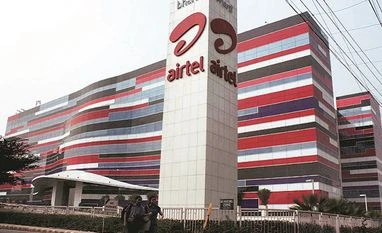Bharti Airtel will see another 2 -5 per cent fall in revenue this fiscal before returning to growth in the following year, as stiff market competition keeps pricing under pressure, S&P Global Ratings said in Friday.
"The increased competition has resulted in pricing pressure for the incumbents (such as Bharti Airtel) and is likely to continue to dent their revenue growth and profitability until fiscal 2019," it said.
As a result, it estimates that Bharti Airtel's consolidated revenue, which is mainly driven by its India business, will fall by another 2-5 per cent in fiscal 2018 before returning to growth in fiscal 2019.
S&P's observations comes after Bharti - the country's largest telecom operator - recently reported its lowest quarterly profit in four years as net earnings fell 72 per cent in January-March, hit by "sustained predatory pricing" of rival Reliance Jio.
The net profit in the quarter ended March 2017 stood at Rs 373.4 crore (or Rs 0.93 a share), nearly a fourth of the Rs 1,319.2 crore (or Rs 3.30 a share) notched in the year ago period.
S&P said its rating on Bharti is unaffected despite the company's weak showing. The results, it said, were in line with expectations and the company continues to have limited rating headroom.
"Bharti Airtel continues to compete aggressively with new entrant Reliance Jio to maintain its market share in India's telecom market," it said.
More From This Section
S&P also expects a 300-350 basis points dip in the company's EBITDA (earnings before interest, tax, depreciation and amortisation) margins for its India operations over the next two years, from 41.4 per cent in fiscal 2017.
The EBITDA margin is a measurement of a company's operating profitability as a percentage of its total revenue, while a basis point refers to a common unit of measure for interest rates and other percentages in finance - 100 basis points is equivalent to 1 per cent.
"The improvement in Bharti Airtel's Africa operations and the company's strong focus on cutting costs should help temper the weakness," it added.
S&P is of the view that the company would continue to take steps to contain its leverage.
"Bharti Airtel still has 61.4 per cent stake in Bharti Infratel of which it could sell a further 10 per cent stake. Such a sale could help further improve the rating headroom," it added.
Bharti's size, operational diversity and recent spectrum buy will help it face the "intense competition" in the Indian telecom market, it said pointing out that the company increased its revenue market share to 33.1 per cent by December 2016, from 31.6 per cent a year ago.
"Nevertheless, the trend in revenue market share and profitability of incumbents remains uncertain until Reliance Jio ends it current promotional services, and Vodafone India and Idea Cellular start operating as a combined unit," it added.
S&P said ensuing consolidation in the telecom market will reduce competition and benefit the industry.
"However, significant loss in revenue market share, weaker profits and higher capital expenditure (including for spectrum) could put pressure on the rating on Bharti Airtel in the absence of further deleveraging," it added.
)